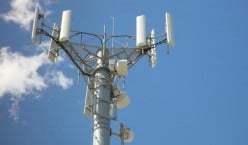US reviews use of cellphone spying technology
 Faced with criticism from lawmakers and civil rights groups, the U.S. Department of Justice has begun a review of the secretive use of cellphone surveillance technology that mimics cellphone towers, and will get more open on its use, according to a newspaper report.
Faced with criticism from lawmakers and civil rights groups, the U.S. Department of Justice has begun a review of the secretive use of cellphone surveillance technology that mimics cellphone towers, and will get more open on its use, according to a newspaper report.
The cell-site simulators, also referred to by other names such as “IMSI catchers” or Stingrays, operate by fooling mobile phones into believing that they are communicating with a legitimate cellphone tower, while harvesting data from the phone including its identity, location, metadata and even content of phone transmissions, according to the American Civil Liberties Union.
One of the complaints of civil rights groups is that even when targeting a single phone, the technology can collect data on other phones in the area that connect to the simulator, raising privacy issues.
For years the Federal Bureau of Investigation used the technology without warrants, though recently the government has started approaching judges for search warrants, according to the report in the Wall Street Journal on Sunday. The newspaper had reported last year that the devices, which were referred to as “dirtboxes,” were used by law enforcement from planes to track people on the ground.
Senior officials have also decided they have to be more open about the use of the devices. But there isn’t agreement within the DOJ yet about how much to reveal or how quickly, WSJ said.
Some legislators have objected strongly to the surveillance. In December, senators Patrick Leahy, a Democrat from Vermont, and Chuck Grassley, a Republican from Iowa asked the federal administration for information on the “potentially broad” exceptions to a new FBI policy to obtain a search warrant before using a cell-site simulator.
The senators, for example, pointed out to FBI policy that cellphone users in public places did not have a reasonable expectation of privacy, and therefore the use of cell-site simulators in such a situation did not require a search warrant.
The senators were also concerned whether the FBI and other law enforcement agencies have adequately considered the privacy interests of other individuals who are not the targets of the interception but whose information is collected by the simulator, and whether a provision for purging of information of these persons after a short period of time was adequate to protect privacy.
The state of Washington passed in April a bill to prohibit ”the use of a cell site simulator device without a warrant” by the state. Some other states have passed or are in various stages of considering similar legislation.
http://www.pcworld.com/article/2918072/us-reviews-use-of-cellphone-spying-technology.html

legal steroids dbol reviews
References:
onedance.tv